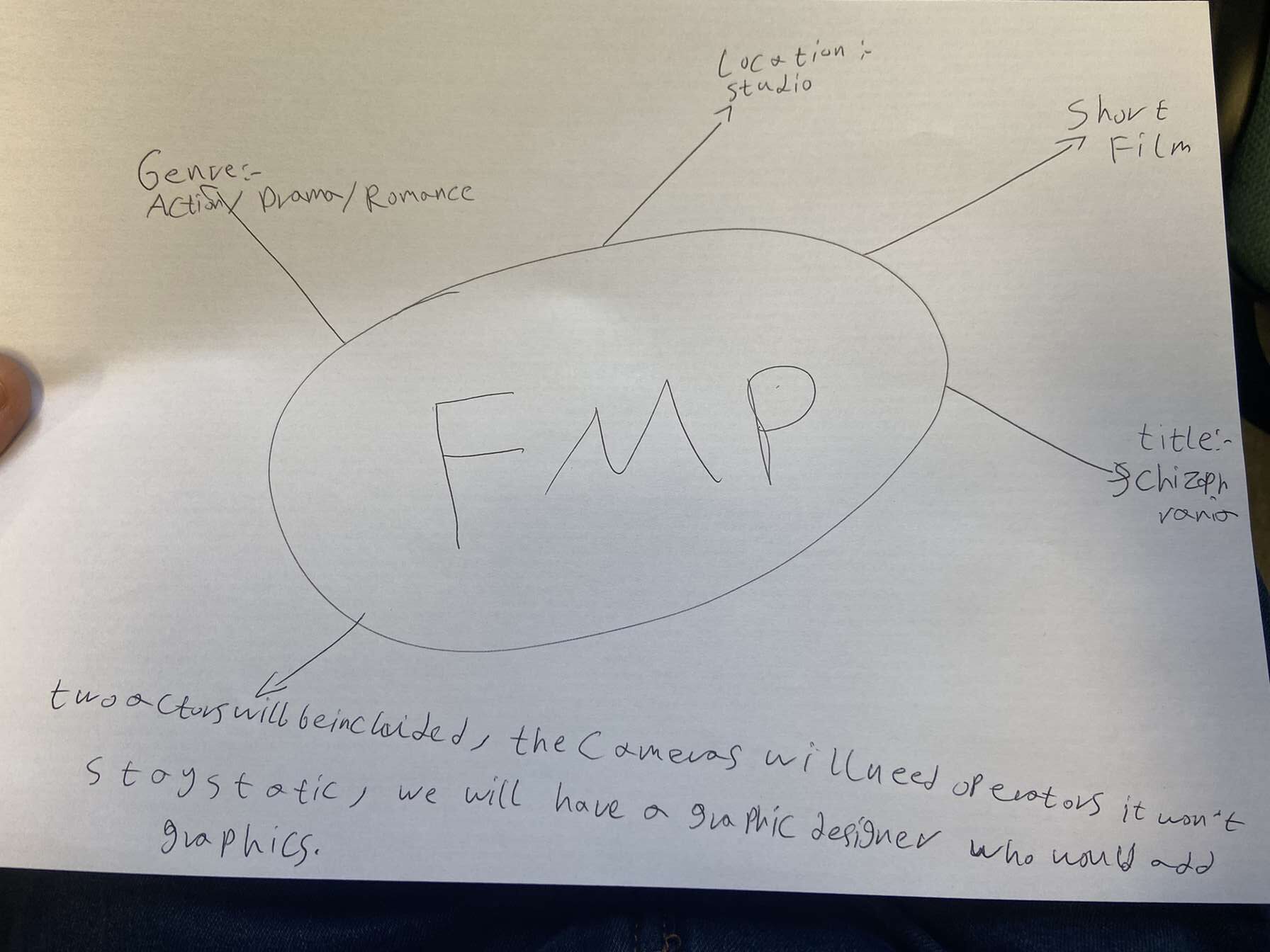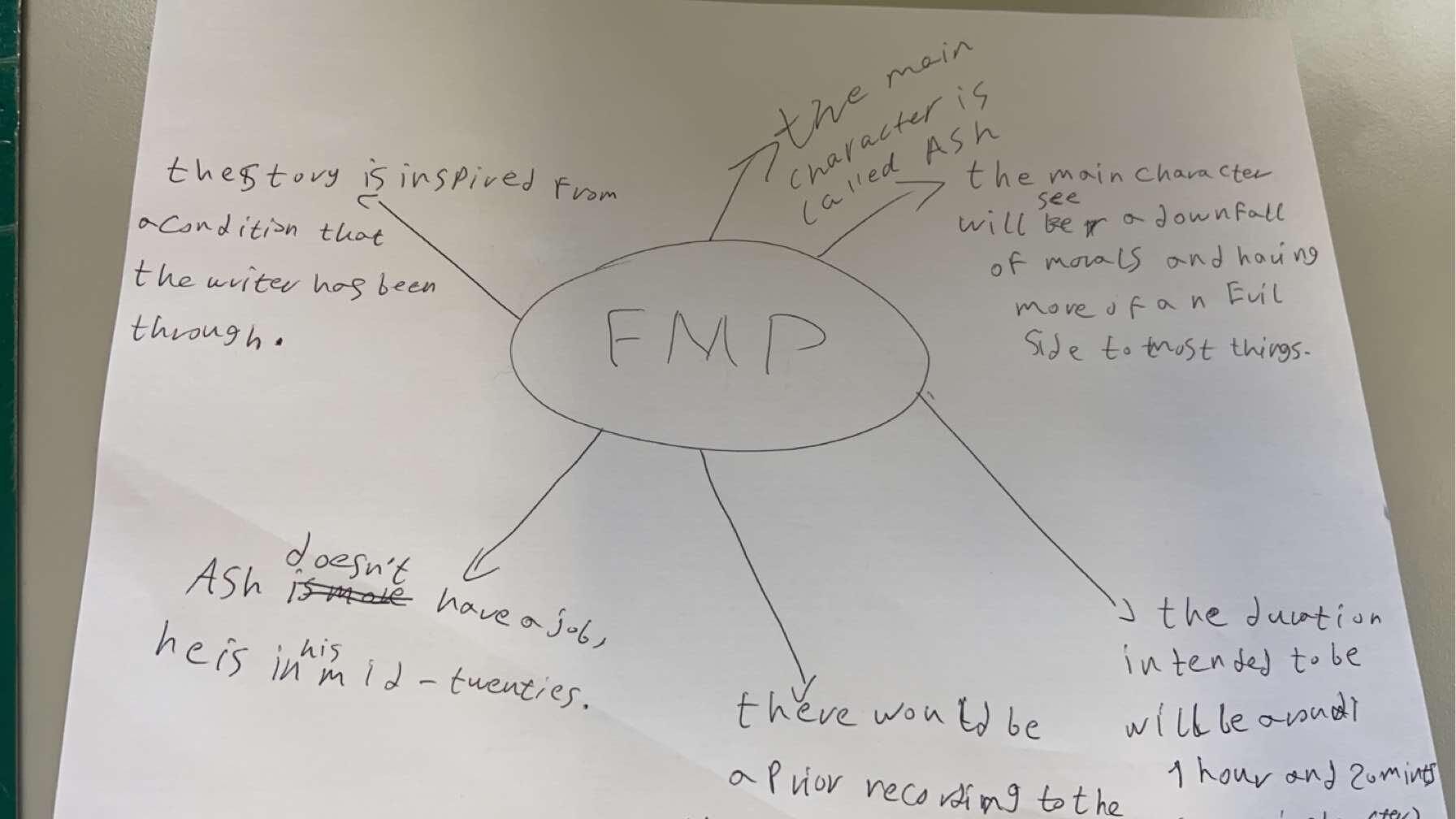








Task 1 Developing an Idea
idea:Short Film

The idea is a fe film written and acted by the same person, the story is about a young man aged around 20’s suffering from his alter-ego as-well as having Schizophrenia.

The plan for this will be that we would have around 16 rehearsals, it will be 3 every week. we will need to book the studio for all of the rehearsals, we will be changing the lighting to have some effect on the audience. the alter-ego would also be recorded by the same person who does the main character in the background. the girl who would be acting as the main character’s girlfriend. the plot would be more intense and dramatic than romantic.
Strengths
The scenario is half way done for the short film and all the cast and crew are in place.
Weaknesses
We don’t have all the cast and crew members which will lead us to hire new people which will take time.
Opportunities
You will get experience in the field being based in a set and filming environment as-well as it being for practice you will still get some experience
Evaluation
The first feedback was Positive through how interesting the idea is and planning wise But moreover most negatives came on The timeline which wasn`t planned correctly or in an organizable way.
The second feedback had a very positive point about my project having a potential and how my PowerPoint is craftly made but the negative points came on the lack of planning which needs improving.
The third feedback hinted at some good positive points like the good planning and vision as well as the proposed idea and some negatives that might affect the project as a whole like the cast not being good and the weaknesses were how short the presentation was and not finished timeline.
The fourth and final feedback hinted at some good positive pointes like how the idea was unique also how i would make it more interesting to the target audience as well stuff that might be a concern on the project as a whole like the audibility of camera and equipment which is really good but the negatives were more on planning and how there is not much to go on in this project and that my timeline and presentation should be improved.
Task 2- Research and idea development.
Genre
The murder mystery is a sub-genre of the crime genre that, of course, focuses and follows the homicide of a character or characters. Involving crime, violence, investigative teams and heartbreak rippling across the victim’s loved ones, the potential for drama is rich.
A murder mystery tends to be along the same lines as a psychological thriller but has its own rightful place in the genre world. There is and can be often a crossover in this respect.
It specifically focuses its plot around the homicide of a character and the piecing together of who was culpable. The murder tends to be at the beginning of the film and the audience is given clues of varying degrees before the grand reveal of who has done the murder at the end.
A murder mystery has always been popular in the context of novels. And this popularity has transferred onto the screen. Moreover, the genre is constantly shifting and updating, keeping itself relevant.
Examples of Modern Murder Mysteries
‘Murder mystery films and TV shows have appeared on screens pretty consistently over the years. The genre can be traced right back to the origins of cinema itself.’
‘But the genre has managed to survive into the modern-day relatively seamlessly. And this is because such movies both play with the genre expectations and fulfil them, creating original and memorable works. Two great contemporary murder mysteries that take different forms and show the range of the genre include…’
Knives Out (2019)
‘Knives Out follows a detective investigator who is trying to get to the bottom of a suspected homicide that was made to look like a suicide. Taking an interesting angle on the murder mystery, Knives Out makes you chuckle, hold your breath as well as keeping you guessing as to the murder’s culprit.’
‘Knives Out has been said to be a modern stylisation of an Agatha Christie novel, as the film takes classic murder mystery techniques and refreshes them. The perfectly developed idiosyncratic characters ensure this peculiar murder mystery grabs your attention as the pressure starts to rise on the Thrombey family.’
Zodiac (2007)
‘This highly rated murder mystery is based on the true serial killer famously named the Zodiac Killer. Starring Jack Gyllenhaal and Robert Downy Jr, Zodiac keeps you on the edge of your seat for its long runtime.’
‘Zodiac takes on the classic murder mystery formula to ensure the genre is preserved even for those who know the storyline. Taking full advantage of timing to ensure that the rise in tension is not too premature to become anticlimactic, the film hits murder mystery beats whilst employing a structure that has something unique to say’.
‘The way in which the mystery peters out in its pacing reflects the real-life trajectory of the case. And in this, it not only keeps the audience guessing but reflects the real-world frustration of the unsolved case’.
‘These two films are examples from the genre that do something interesting with it. And we’ll continue to refer to them throughout the article. But let’s now get down to what exactly makes up a successful murder mystery script…’
Script Writing
1. What is Your Murder Mystery?
Deciding on what your murder mystery is will obviously be key to a successful script. And this should be the starting gun on your story. It needs to be believable, not too complex, and yet keep the audience guessing.
To do this, draft out some key moments in the mystery.
- What makes the murder a mystery?
- Who is going to be the suspect/s?
- Will a murder actually happen and will we see it?
- What does the murder look like?
All these questions will help you think through what your murder mystery actually is. From there you can start developing the structure and a proper storyline.
The nature of the murder is often what will make the story distinctive within the genre and marketplace. So don’t botch this bit. Make your murder original and remarkable.
2. Setting Up Your Murder Mystery
‘This leads nicely on to setting up your murder mystery. After you have developed your idea for a murder to be solved you need to think about how you will set it up in the narrative’.
- How is it going to be introduced into the storyline?
- Will your screenplay start with the murder?
- Is the murder just implied, or will you see someone be mysteriously murdered?
- Who will discover the body?
‘Setting up your murder mystery script should feel like a natural process, nothing too complex in the lead up to ensure everyone is on the same page whilst watching.’
‘As this is the sub-genre of choice, the screenplay should be mainly focused around the murder. So setting it up will need to be a delicate procedure in terms of you tackling it’, Like for my Script I only focused on the murder and what follows it I didn’t try to take it in other directions or focus on unwanted details .
‘Making sure these characters work together to tell the story you want, in the way you want, is crucial. These are the characters that will make your story convincing. Therefore, building their personalities, their relationships with one another and their connection to the audience becomes a turning point in the process of screenwriting’. I lacked this in my script since I only focused more on how the story is going and how the characters are contributing to the events.
‘Choosing who your protagonist will be is a big part of how you will convey your story and what you tell the audience. This will be the character that leads your narrative. So understanding the details of the character is essential to building a convincing murder mystery script’. There weren’t that much details given because it’s a short film and mainly focused on minor details.
This research is taken from this website https://industrialscripts.